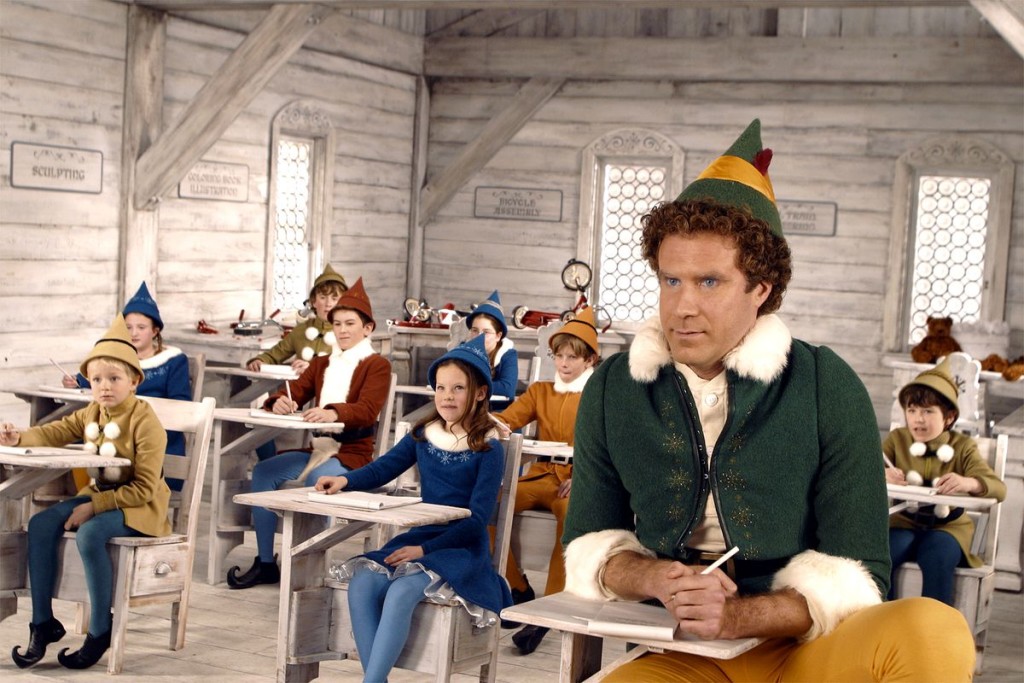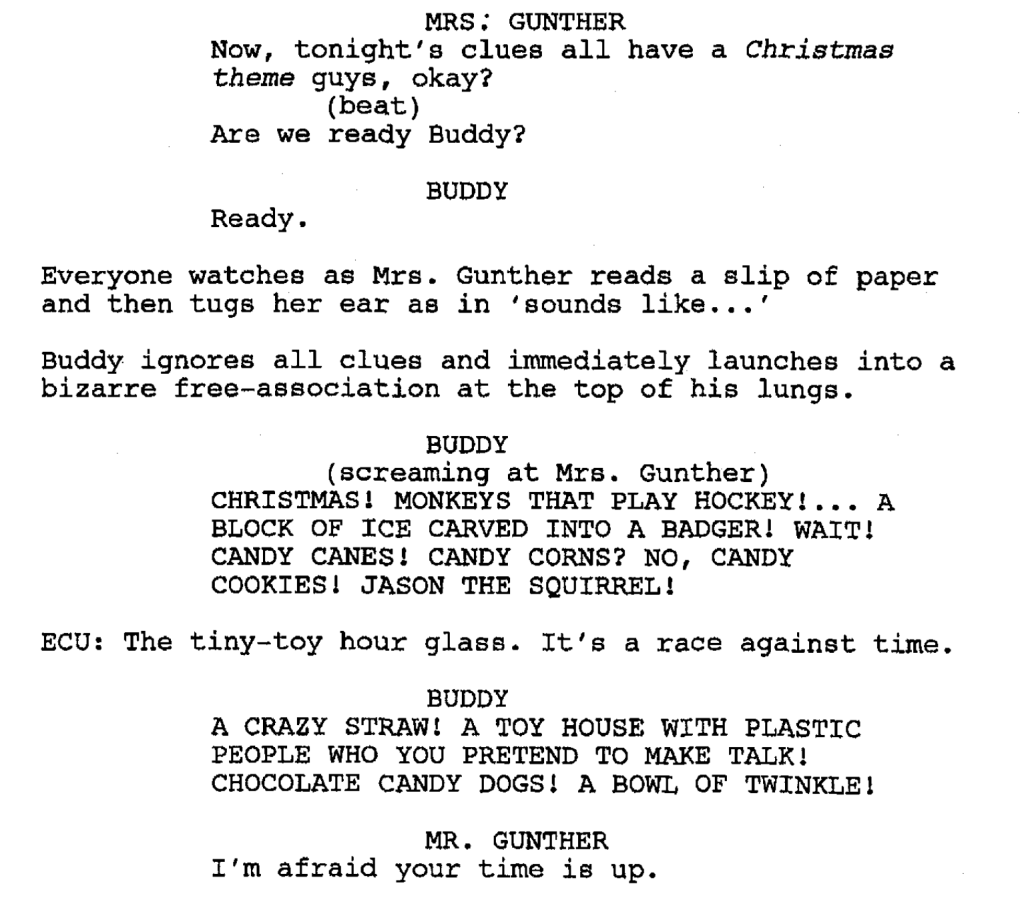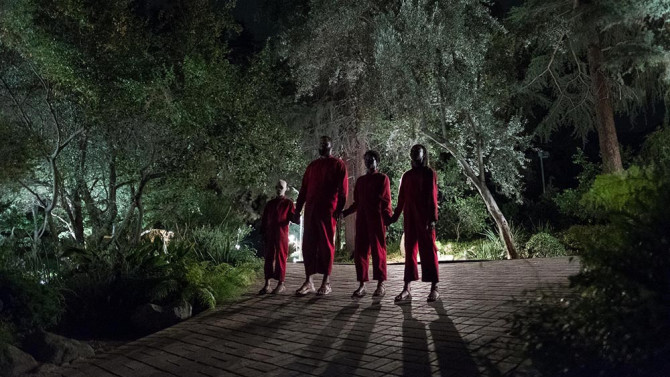These horror submissions were shut out of Horror Showdown. Why?? Also, stay til the end because I announce the next SHOWDOWN!
I always say that running a contest is one of the worst things a person can do. You make one friend and 999 enemies.
And I get it. You see the entries that made Horror Showdown last month and you think, “My concept is better than those.” First off, you’re probably wrong. However, a few of you might, indeed, be right.
Therein lies the immeasurable conundrum of subjectivity. You might have a cool idea that I’m just not into. I’m not a fan of movies about magic, for example, like Harry Potter. I find them abracadumb. But, obviously, there are people who love Harry Potter and whom might anoint your magic concept the best idea they’ve ever seen.
Also, whoever’s running the contest is looking for a specific type of script. Nicholl celebrates high-minded fare where theme takes precedence over everything. The Black List is turning into a site that celebrates social commentary. For me, right now, I’m looking at concepts and asking, “Is this a movie I’d want to make?” If the answer is no, I don’t need to deliberate any further.
Both of those things – subjectivity and could this be a movie – are driving 95% of my choices. Just because your script didn’t win those two battles doesn’t mean it’s a bad idea. So don’t get down on yourself if you didn’t get picked.
With that said, there are concepts that are just straight up weak. And the purpose of today’s exercise is to help writers identify why a concept or logline doesn’t work and what you can do to improve your concepts moving forward. Let’s get to it!
Title: One Night in the White Mountains Under a Black Sun
Genre: Drama/Horror
Logline: In 1936 the lives of seven strangers violently collide when they become snowbound in an Italian hotel while one of them must stop a Nazi plot that would destroy the world.
Analysis: I wanted to get Felip’s entry in here because I could sense his audible frustration at not making the showdown (I love you, Felip!). This script actually finished in the top 15 because I thought the logline was intriguing. But the reason I passed on it had more to do with the Why You Should Read – “I just wanted to spin a decent yarn with Nazis and underground cults and black magic and werewolves and aliens.” Once I saw all that, I knew it was too much for me. There have been a few times in Scriptshadow history where I’ve liked “everything and the kitchen sink” scripts. But usually, I’m not into them. And once you have werewolves, Nazis, aliens, cults, and black magic? I just knew that wasn’t going to be for me. I tend to like simpler more direct concepts.
Title: THE PROJECTIONIST
Genre: Horror
Logline: A group of teens discover an old movie theater projector abandoned in a barn and inadvertently unleash a wave of horror after they switch it on.
Analysis: At first glance, this sounds like it could be a movie. But there’s one issue holding the logline back. We go from A to C instead of from A to B to C. We start with an old movie theater projector. Okay. There’s something a bit mysterious about that. However, how does switching it on unleash “a wave of horror?” Was the projector owned by someone dangerous? Maybe if there was a bit more information about WHY the projector unleashed this horror, I might’ve given this one a shot.
Title: Blood
Genre: Horror / action
Logline: A former combat medic, now providing rapid-response medical assistance for LA’s criminal underworld, takes on a trafficking gang harvesting teenagers’ organs for sale on the black market.
Analysis: I get the feeling that Ben tried to sneak an action script into the horror showdown here. So that’s the main reason I didn’t pick it. But I’m highlighting this concept to warn people off “organ trafficking” storylines. This is a 20 year old idea at this point. I know specifically how the town feels about organ trafficking because a couple of years ago I found a really good script about organ trafficking and I tried to pitch it to a bunch of people. Nobody would read the script the second they heard “organ trafficking.” it’s just a dead subject matter. If you’re going to do it, do it like they did it in Squid Game, where it’s a Z-story.
Title: Slaughterhouse
Genre: Horror
Logline: A documentary crew goes undercover to expose the horrors of factory farming, but things turn grisly when their project is discovered by a group of brutal farmers.
Analysis: This is a perfect example of how subjectivity plays into choosing scripts. I can’t stomach anything where animals get hurt. It just gets me thinking about all the animal harm going on in the world and I get really depressed. So this was a ‘no’ for me immediately. But from the writer’s e-mail, he pointed out that this script has gotten him a lot of meetings. So, obviously, other, less-sensitive people, have no issue with the subject matter. I just want you guys to see this so you don’t get too down about a rejection. There could be something in your idea that someone is simply sensitive to. I know people who won’t read anything about rape. Or abortion. There’s nothing you can do about that so there’s no reason to get down about it.
Title: The Malignant Shift
Genre: Psychological Thriller / Horror
Logline: One year ago, a fringe religious sect vanished into the wilderness of an undisclosed location. Today, a group of idealistic documentarians set out in search of them for the story of their lives. Tomorrow, they discover that some things are better left undisturbed.
Analysis: I wanted to highlight this entry for a specific reason. It contains a classic logline mistake that I see writers make over and over again. The logline starts off strong then dissolves into nothing. It amounts to, “Some documentarians set out to find a fringe religious sect who vanished into the wilderness a year ago… and then scary stuff probably happens.” The end of of a logline shouldn’t be a teaser. You want to tell us what happens. If the sect turned into cannibals, tell us that. If they were eaten by giant wolves that are now hunting our documentarians, tell us that. If the woods trap them until they starve to death, tell us that. The “exciting first half logline” that then becomes the “vague ending logline” is one of the biggest logline mistakes you can make. You gotta be specific about what happens.
Title: The Doppelgänger Suite
Genre: Horror
Logline: A paranormal team — headed by a grieving estranged married couple who’ve suffered a family tragedy — shoots their season finale at an accursed New Mexico hotel plagued by a century-long string of physically impossible suicides. Unless the married couple can reconcile and solve the mystery, they and their team will become the hotel’s next victims as their blackest secrets, desires and agonies take human form in a murderous game that must conclude by dawn.
Analysis: I passed on this one for one simple reason. Too long of a logline. I know everyone hates writing loglines. I used to hate them too. But being able to write a cohesive logline that quickly conveys the concept indicates to readers that this writer has been at the craft for a while, understands that writing loglines is a necessary evil, and knows what they’re doing. When I see a logline this long, 99.9999% of the time, the script is messy. Here’s the thing. Once you learn how to write a strong concise logline, you also learn how to be a concise storyteller. You’re more focused, both with your overall screenplay, as well as the scenes within your screenplay. Someone recently asked me how long a logline should be. There’s no universal number, but somewhere around 30 words is ideal.
Title: THE FUMIGATOR
Genre: Horror
Logline: A highly ritualized serial killer uses his fumigation services to isolate and torment a troubled family in their own home.
Analysis: Shout out to Brett for this entry. Always love to see Brett enter. Here’s my issue with this one. The concept borders on comedic. If you explain to me that someone would use those big house coverings to hide their killings, that does make sense. But those tents all look like something you’d see at a carnival. The title “The Fumigator” comes close to sounding like a horror parody. And, also, I couldn’t figure out how the killer’s plan worked. The families all have to leave the house while it’s being fumigated. So how could the killer trap them if they’re already gone? It was just one of those ideas that didn’t quite work for me.
Title: Monster Bait!
Genre: Horror Comedy
Logline: While on a family ski trip, a teen’s efforts to win over his girlfriend’s dad go horribly wrong when a curse makes it so that every time he masturbates – a monster kills the object of his lust.
Analysis: Okay, “Monster Bait” is a funny title. But when it comes to horror comedy, my bar is higher than the elevation your last flight flew at. A horror comedy idea has to be absolutely amazing for me to bite. And this one didn’t make a lot of sense to me. I thought a curse just makes things happen. I wasn’t clear why a monster needed to appear (for example, when I think of a curse, I think of Tom Hanks in “Big.” He becomes an adult. That’s the curse. There aren’t also demons flying around trying to kill Tom Hanks). There’s a logic-chain to these concepts that needs to be clean and this one was too messy for me.
Title: The Slaying at Rustic River
Genre: Slasher Flick
Logline: Five college friends vacation at a remote cabin in the woods, however, they soon find themselves hunted by a killer whose motives are fueled by an unspeakable event linked to the group’s past.
Analysis: Another classic example of a logline not giving us enough information. It’s being vague. Loglines must be SPECIFIC. It is the SPECIFIC that intrigues the reader, not the GENERIC. Here’s the key problem phrase of the logline – “are fueled by an unspeakable event linked to the group’s past.” TELL US THE EVENT. Don’t talk around it. The event from the past is the hook. Without it, what’s unique about this concept?
I wish I could’ve gone through all of the entires but I only have so many hours in the day! So what do you think?! Should any of these have made the Horror Showdown? Who should’ve gotten in? Who should’ve been pushed out?
***ANNOUNCEMENT***
Finally, the official announcement of the next showdown will be in the newsletter. But here’s the unofficial announcement. The next Showdown is titled ANYTHING GOES SHOWDOWN. That means any script, any genre, any concept – it’ll be open to every script. We’re going to fold “WEIRD SCRIPT SHOWDOWN” into ANYTHING GOES SHOWDOWN. And I am going to be paying special attention to those weirder ideas. One or two of those will definitely make the showdown. So you did not write those scripts in vain. The deadline is FEBRUARY 3RD. So you have exactly three months to get your scripts in shape. GOOD LUCK!
Holy Guacamole. I’ve actually found a good Black List script!
Genre: Thriller
Premise: An obsessed fan maneuvers his way into the inner circle of his hip hop idol and will stop at nothing to stay in.
About: This script finished pretty high on last year’s Black List, with 11 votes. The writer is young and relatively unknown but he did work as a story editor on “Dave,” which is a really funny show on Hulu. I’m not sure what a ‘story editor’ on a show does so maybe one of you TV guys can fill me in. Either way, this is a brand new writer so let’s see what he’s got!
Writer: Alex Russell
Details: 109 pages
Whatever happened to the stalker genre?
I love a good stalker movie.
Remember “The Fan?” With Robert DeNiro and Wesley Snipes? Funny story about that film. In one of the pivotal scenes, DeNiro and Snipes had a charged conversation while throwing a baseball back and forth to each other (Snipes plays a star baseball player in the film). Everybody in the production had been looking forward to shooting the scene since the beginning of the shoot. It was one of those Mano a Mano scenes between your two big stars where they really go at it.
So they start shooting this scene in a wide shot and they realize very quickly that DeNiro can’t throw a baseball. He literally looks like a little kid trying to throw a ball for the first time in his life. Here DeNiro is playing this ultra-tough guy stalker in the movie. The scene is about him covertly threatening Wesley Snipes’ character. And he’s spraying the ball around like a spastic monkey.
Everyone in the production had to huddle together – away from DeNiro of course – to figure out how to deal with this unforeseen obstacle. After talking it through, they realized the only way to do this without letting DeNiro know how embarrassing his throwing was, was to shoot the two players in ultra close-up, which hid DeNiro’s inability to throw. So if you go watch the movie, you’ll notice this scene plays out a little weird, with these ultra close-up shots that don’t really allow you to enjoy the scene.
Just goes to show how hard making a movie is. You never know what kind of problems you’re going to run into on a day of shooting.
Matthew is 22 years old and works at American Rag on La Brea (great place to find jeans by the way). Like a lot of people in LA, he’s lonely and confused. He can’t seem to make friends no matter how hard he tries. Hell, he lives with his grandma. He’s not exactly ‘killing it.’
Then, one day, across the street from work, Matthew notices his idol, a fast rising music artist named Oliver. Oliver hurries over to American Rag to escape a gaggle of fans. Since Matthew knows everything about Oliver, including the music he likes, he quickly changes the music in the store to what he knows is one of Oliver’s favorite tunes.
As soon as Oliver hears this, he asks who’s in charge of the music, and Matthew introduces himself. They talk about old music for a while and Oliver is so impressed with Matthew’s knowledge of music that he invites him to his concert that night. Keep in mind, Matthew has pretended this entire time to have no idea who Oliver is, which is one of the main reasons Oliver likes him. Matthew is not a “fan.” He’s a “real person.”
At the concert, Matthew meets Oliver’s entire crew. They’re a little skeptical of him at first, especially Shai, Oliver’s longtime friend and manager. But because he’s harmless, they let him in. This leads to Matthew visiting Olivier’s house. And, after a while, being given the reins to shoot an informal documentary about Oliver and his entourage. It allows Matthew to get very close to Oliver. He’s officially living his dream.
That dream leads to Matthew becoming his own celebrity of sorts since he’s all over Oliver’s Instagram. Everything is going great until Matthew revisits his old job where he runs into his co-worker Jamie. He stupidly invites Jamie to Oliver’s next event and the crew unexpectedly loves Jamie. They love him so much, in fact, they invite him on a big trip to London! All of a sudden, Matthew is losing status within the group.
Matthew needs to find a way to get Jamie out of the group without it looking like he tried to get Jamie out of the group. So he covertly injures him on the next video shoot. The move backfires as Oliver finally realizes that Matthew is just another crazed fan. After he kicks Matthew out of the group, Matthew must come up with a last ditch plan to get into Oliver’s good graces… forever.
Goal. Stakes. Urgency.
None of these are present in Lurker.
And yet the script still works.
Why?
Well, remember. All goal, stakes, and urgency do is provide your screenplay with an engine that propels the plot forward. Give characters a tesseract to go after (goal). Establish that if they don’t get it, the world blows up (stakes). And give them a short time frame to do it in (urgency). The reason I push GSU is because it’s the most powerful engine you can use to generate a story. But it’s not the *only* engine.
Another engine is the “levee breaks” engine. You either tell or imply to the audience that, at some point in the movie, the levee is going to break, and then you slowly build up to that moment. Since the reader knows the levee is going to break, they don’t necessarily need immediate goals. They still need characters doing things. But they don’t some giant involved plot.
The most famous example of a “levee breaks” engine is Titanic. Titanic doesn’t have a goal other than for Jack to try and seduce Rose. The engine that’s really driving our interest is the impending doom of hitting that iceberg and a good chunk of these people on the boat dying.
The “levee break” in Lurker is slightly different. It’s Matthew’s obsession with Oliver. We know that Matthew can’t help himself. That he’ll keep pushing and pushing until Oliver has no choice but to push back. And that eventual clash – the levee breaking – is why we keep reading. We know it’s coming and we can’t help ourselves. We want to see what happens.
By the way, just because you employ a “levee breaks” engine, that doesn’t mean your script is going to write itself. In fact, the reason this isn’t as common of an engine is because it’s harder to execute. Think about it. When you have GSU, you always know what your character’s going to do next since the character’s job is to achieve his goal. If the goal is to take down an island dictator (The Suicide Squad), then you just keep writing scenes that bring your heroes closer to that goal.
But what do you do if your character doesn’t have a narrative-defining goal? The options aren’t as clear. However, Lurker gives you a good template for tackling the problem. Have your hero push for more as the script goes on (Matthew wants to be more involved in the group – every 15 pages he wants more access, more responsibility) and then you introduce obstacles that create setbacks for your hero (Oliver starts to like Matthew’s buddy Jamie more than him, Oliver says he only wants Matthew to document the team, nothing more).
This struggle creates conflict and, remember, conflict is the lifeblood of drama. And drama is what generates entertainment. So we’re entertained by Matthew desperately trying to get closer and closer to the center of the group – he won’t stop until he’s practically INSIDE Oliver.
The script also has a beat on the Gen Y crowd. It feels modern. It feels up-to-date. Just the fact that Matthew becomes a quasi-celebrity because he’s on a famous person’s Instagram is a real thing. These celebrities have people around them all the time and they’re taking pictures of them, posting them, and people who want to know everything about those celebrities of course want to know who the people surrounding them are as well.
Finally, the script has something to say. It’s shining a light on the shallowness of today’s celebrity. There’s a scene in the script where Matthew is approached on the street by someone who recognizes him and he starts asking Matthew what he can do to be like him. What skills can he build? What classes can he take? And Matthew just kind of stands there realizing he has no skills. He’s just some guy who got lucky and is now stalking a dude. Which begs the question – is that the definition of celebrity in 2021?
If you like stalker scripts like I do, you’re going to love this. Check it out!
[ ] What the hell did I just read?
[ ] wasn’t for me
[xx] worth the read
[ ] impressive
[ ] genius
What I learned: Plot beats that shake up the story must make sense logically and dramatically. One of the only mistakes in the script was when Matthew willingly invited Jamie to one of Oliver’s events, which led to Oliver and the crew liking Jamie more than they liked Matthew. If you think about this plot beat, it doesn’t make sense. Why would Matthew bring someone else into the fold who could potentially expose him (remember, Matthew pretends that he’s never heard of Oliver until Oliver walks in the store – but Jamie knows otherwise). The more logical beat would have been for Jamie to have gotten into the event on his own somehow, and surprisingly bumped into Matthew and Oliver.
Will Ferrell turned down 29 million dollars to do Elf 2. Did he make a mistake?
Genre: Comedy
Premise: Several years after becoming a viral sensation in New York City, Buddy and his wife decide to move to the suburbs to raise their daughter, where Buddy encounters an entirely new set of life obstacles.
About: Last night I read this Hollywood Reporter piece on Will Ferrell, who’s coming out with his first TV show, The Shrink Next Door. It’s a good article. Ferrell talks about why he and longtime collaborator Adam McKay split up (McKay wanted to take over the world and Ferrell didn’t feel like he had the bandwidth to join him) as well as why he turned down Elf 2. He stated that, after reading the script, he felt like he’d be making the exact same movie, and didn’t feel like he could face the public if he did that. Elf 2 was written by Scot Armstrong (Old School, The Hangover 2).
Writer: Scot Armstrong
Details: 119 pages – First Draft – July 29, 2005
Elf always seemed like a movie that everyone who participated in it endured, rather than enjoyed. No one really wanted to make it – both director Jon Favreau and Ferrell have publicly expressed their reservations about making the movie at the time. It was a ‘prove it’ role for both of them. So when it became this giant hit, everyone was surprised. And yet, even today, there seems to be this distance both parties have created between themselves and the movie. Which is bizarre because Elf is a really good movie.
This might partially explain why, even though Ferrell was offered 29 million dollars to reprise his role, the movie never happened. The main creatives behind the show simply didn’t like the movie. You know when straight-shooter James Caan (who plays Buddy’s father in the movie) is the biggest cheerleader for your film, you’re in trouble. The vibe I’m getting is that the studio had one shot to get Ferrell on board – a great script. So they hired Scot Armstrong, who’d written Ferrell’s breakout movie role (Frank the Tank in Old School), and this was the result.
Elf 2 takes place an indeterminate number years after the first one. Buddy and Jovie are now married and they have a 10 year old daughter, Susie. Buddy has become a successful children’s book author, specializing in Christmas stories, of course. Even though everyone thinks his stories are imaginative and creative, all Buddy’s doing is telling real stories from his childhood.
Despite how much Buddy loves New York, the reality is that Susie’s getting older and it’s not the best place to raise children. So they move to the suburbs. Soon, Susie is going to school, making new friends, and that’s when she meets cool girls Jess and Jamie. The three become instant besties, which is the first time Susie’s told by someone that her dad is weird. It’s a shock for Susie but the more she thinks about it, the more sense it makes. I mean, her dad *does* walk around in an elf outfit everywhere.
One day, Susie comes home and yells at her father for not being “normal.” Buddy is so mortified and desperate for his daughter’s love that he researches what “normal” is and changes his entire life to fit into this new category. Gone are the 7000 daily calories of sugar, gone is the elf outfit, gone is the name “Buddy.” Instead, Buddy now wants to be called the most normal name in the world, “Brian.” This doesn’t have the intended effect as Buddy’s attempts at acting normal only make him weirder.
One night, Jess’s father, Mr. Spicer, invites Buddy, Jovie, and Susie, over for a dinner party, which is the perfect chance for Buddy to prove that he’s normal. But, during dinner, the a-hole Mr. Spicer secretly dresses up as a leprechaun, and pops back into dinner pretending to be Buddy, acting as weird and awkward as possible. Susie now knows the truth – that her dad will always be the butt of the joke, and no longer wants him as a father.
As if that isn’t heavy enough, Buddy learns that Papa Elf has just been kidnapped by the South Pole (this happens on page 80 by the way). Snowy the Snowman dematerializes and flies to New York to recruit Buddy to save Christmas. But Buddy’s not Buddy anymore. He’s Brian. So he refuses. With every aspect of Buddy’s life falling apart, he’s unhappy for the first time. Will he become an elf again and save the day? Or will he stay true to being the normal guy his daughter demands that he be?
My initial reaction after reading Elf 2 was, “Will Ferrell, you’re being way too hard on this script!” Ferrell saying he’d be retreading everything from the first movie… I guess I *kind of* see where he’s coming from. But not really. In fact, I’d say this script tries so hard to be different from Elf that it actually hurts the story.
Elf 2 is a character piece. It’s about a complex father-daughter relationship and that always difficult transition that occurs when your kids become self-aware and start to care about what other people think of them. It’s about those first steps children take away from their parents in an attempt to become individuals. It’s raw, it’s sad, it’s complicated. This story is pretty hardcore!
I didn’t see any character depth even remotely approaching this in the first film. So what is Ferrell talking about? Ferrell plays almost a completely different character. He becomes “Normal” Buddy, which creates an interesting conflict within himself, because his instincts are to be one way yet he’s trying to become this other person. It’s actually quite deep.
Ironically, that’s what holds the script back from being great. Typically, in these big budget movies, the character stuff is the B-story. The A-story is the overall plot that’s driving the character forward. For example, in the original “Elf,” it’s Buddy trying to find and connect with his real father. 80% of the movie is the shenanigans built around him trying to achieve this goal.
You don’t have a have a big A-story like that in Elf 2 because it’s so focused on character stuff. And, for that reason, the plot sort of putters along. This is important to understand so let me reiterate it. You want a big strong story engine to thrust your character into his journey because, inevitably, your story is going to slow down at some point. It always does in the second act. So if you never had any thrust to begin with, then your story doesn’t just get slow in the second act. It becomes glacial. That’s what happens in Elf 2.
With that said, Elf 2 is still a pretty good script. Buddy is such a funny character that it’s hard not to stumble into a big laugh every once in a while. For example, there’s a scene where Buddy plays charades at the dinner party and he’s just so over-the-top you can’t help but laugh.
And Scot’s a good comedy writer. If you write comedies, you should definitely read this. He’s got the professional side of the craft down. And he also knows how to convey laughs on the page, which 98% of the comedy writers I read do not know how to do. Usually I get a comedy writer who’s either really good at formula but unfunny. Or someone who’s really funny but has no idea how to write a screenplay. Scot’s someone who can do both.
The more I read into this Ferrell interview and the more I learn about the production of Elf, it seems to me that nobody really liked making that movie and they were all dumbstruck when it became a hit. I think Ferrell had already made up his mind that he didn’t want to do an Elf sequel even before he read the script. But the studio had to do its due diligence and write a script to try and get him to say yes. They did. But he was going to say no no matter what and just came up with this excuse that it was the same movie.
Script Link: Elf 2
[ ] What the hell did I just read?
[ ] wasn’t for me
[x] worth the read
[ ] impressive
[ ] genius
What I learned: In big movies, the character stuff can’t be the A-plot. It has to be the B-plot. This is because big movies need giant stakes. Here, the character stuff (Buddy trying to win his daughter back) is the A-plot, and it’s just not big enough for a gigantic comedy film. It ends up making the movie feel small.
What I learned 2: But Carson, what about personal stakes? Those are high in this movie. Yes, the personal stakes (Buddy trying to win his daughter back) are high. But in big movies, it’s not enough. You need both the overall stakes AND the personal stakes. In smaller, indie movies (movies like Moonlight), it is acceptable to only have personal stakes.
Two Scriptshadow vets make the Blood List!
Cause this is thrilllllerrrr. Thrilllllerrr niiiight. And no-one’s gonna save you from the beast about to strike…
Is it normal for homeowners to get mad at you for trick-or-treating at 8am? Based on the cursing assaults I endured this October 31st morning, I would conclude that that answer is ‘affirmative.’ Well excuuu-uuuuse me for trying to get a jump on my competition. On the plus side, these trick-or-treating deniers probably saved me from early onset diabetes. I was only able to consume several dozen Resses Peanut Butter cups instead of my target goal of 200.
It also gave me time to catch up on some entertainment. I finally watched Free Guy over the weekend and while I shouldn’t have been surprised at how good it was, I was surprised at how good at was. You have to understand that this never happens. Someone writes a big-budget movie spec, it gets purchased, it gets made, it’s actually good, and it does well at the box office. I mean, when’s the last time that happened? Eons ago. The studios save their big budget $$ for established IP. They don’t do it for specs.
But maybe that’s changing. Between Free Guy and the success of The Tomorrow War on Amazon, we could be entering a resurgence in big budget spec scripts that get purchased then made into movies. It will be a tepid resurgence. But if the scripts that come out of the resurgence do well, that resurgence will grow. You have to understand that the reason big budget specs disappeared from the landscape in the first place is that they kept bombing at the box office. Specs like 47 Ronin, R.I.P.D., and Transcendence kept doing so badly that studios were finally like, “F#@% this.” And could you blame them?
Remember that the key for any big budget spec is a strong concept, which both Free Guy and The Tomorrow War have. As much as I’d like to say execution is everything, that’s not necessarily true with these giant movies. You need an idea that gets a ton of people intrigued. If you can then execute that idea, it’s the cherry on top of the sundae.
Speaking of big-budget, Eternals finally hits theaters next week. The film, which was directed by the Oscar-winning director of Nomadland, Chloe Zhao, is Marvel’s riskiest project yet. And while we all know risk is the key to writing something great, risk also means your failures will be more spectacular. And from everything I’m hearing, Eternals is a spectacular failure with an aggressive inability to entertain.
The thing I’m most surprised about with Eternals is that Marvel went against the formula it used to become a giant powerhouse, which was to introduce a series of individual characters in their own movies, establish their brands as superheroes, before finally teaming them up. Eternals, meanwhile, started with the team-up. And when you start with the team-up, you’re going to be spending a TON of time introducing and establishing who each individual character is, leaving no time for a story. From what I’m hearing, that’s the main problem with the film.
While I’m curious to see just how bad it is, I’m not sure I want to waste three hours of my weekend and the insanity of trying to find a parking spot at The Grove to see the film. So I’ll leave it up to you guys. Do you want me to review this movie next Monday? Is anyone going to see the film?
The box office this weekend wasn’t wonderful. Dune had a 57% dip, which, to be fair, was better than WB’s recent releases. Antlers proved to be too dark of a horror flick for moviegoers, scoring just 4 million bucks. The big new release was beloved director Edgar Wright’s “Last Night in Soho,” which didn’t do so hot either, also taking in 4 million dollars. Unfortunately, Wright now exists in this tweener world where the movies he makes don’t automatically feel like theater movies. You could easily imagine this debuting on Netflix. Which is unfortunate. While I’m not the biggest Wright fan, he’s one of the only directors out there directing original material. If we keep losing these guys to streamers, the only movies we’re going to see in theaters is Eternals.
If that gets you down as much as it does me, I’ve got something to bring you back up. The 2021 “Fresh Blood” Blood List was released over the weekend and you might recognize two faces. Mainstays Katherine Botts and Tal Gantz both made the list. Tal made the list with his script, “Hide Me Among The Graves,” about a physics student who learns his body was found in a 19th century grave, then must solve a sinister time-travel mystery before his fate catches up with him. Katherine made the list with co-writer Mischa Marcus. Here’s the logline for their script, “House of Mourning:” After the suicide of her Jewish husband, an un-faithful widow must confront her sins, which have attracted a violent demon who threatens her and the other mourners as they sit shiva over seven days of escalating terror.
The Blood List has recently teamed up with Village Roadshow to develop projects and they’ve picked two screenplays from the list this year. The first is, “On the First Day of Christmas” by Casey Giltner. Here’s the logline: When a little girl begins receiving mysterious Christmas presents, her parents realize the gifts have a sinister intent, coinciding with “The 12 Days of Christmas.” The second script picked was “Zero Feet Away” by Jose Nateras. Here’s that logline: A young man’s love life is complicated by his identity as a gay, Mexican-American, Werewolf, while his actual life is put in danger by a mysterious serial killer who seems to be zeroing in on him using a location based hook-up app.
I’m excited about Katherine’s script. I’ve had several conversations over the years about the Jewish religion being an untapped resource for horror ideas. While it seems like Catholicism has been pilfered endlessly for horror mythology, the average moviegoer knows little about the specifics of the Jewish religion. I sensed there were plenty of dark paths within that religion to create new horror mythology. Katherine, along with her writing partner, are finally doing that. Smart!
For those of you confused about the Blood List, which used to categorize its Fresh Blood and Blood List as different entities, they’ve since consolidated and created one singular list focused on finding unknown talent. I believe this was done in order to make a deal with Village Roadshow to produce projects from the list. My only regret is not reviewing Cinder sooner as I’m sure it would’ve made the list too!
Finally, in one of the bigger, “Wait , did I just read that right?” moments of the year, it was recently revealed that Will Ferrell turned down 29 million dollars to be in Elf 2. Now, for all of us looking back at that number, this seems certifiably crazy. But you have to remember, back then, they were giving out 20 million dollar checks to studio comedy leads like candy. Those guys probably thought those days would never end. Well, they have ended, and if you injected Will Ferrell with truth serum, I bet he’d tell you that, if he could do it all over again, he would’ve taken the money.
Since I don’t have access to Ferrell, I’m going to take the truth serum myself and read the Elf 2 script tomorrow. Tune in for the review.
Oh, and if you need some extra Monday reading, here are script reviews from several of the projects mentioned today…
Dune Script Review.
Free Guy Script Review
Transcendence Script Review
Why Transcendence the movie wasn’t as good as the script
Antlers Script Review
Halloween is just about here! I’ve got my Halloween costume all picked out and ready to wear. I went with the top half, creepy Squid Game Red Light Green Light Girl, and bottom half, Dune sand worm. I’m also gearing up for a 24 hour horror movie marathon. First movie on the docket? Why, of course, Boo 2! A Madea Halloween. Was that ever in question?
What I’m even more excited about is reviewing tomorrow’s Halloween Horror Showdown winner, Cinder (“A crew of firefighters fall prey to a mysterious presence when they respond to a fire at a secluded farmhouse.”). It sounds like it could be a winner. Make sure to tune in for that.
In the meantime, I thought I’d give you the 10 most successful horror films of the last decade. Since I can already hear you tallying up the movies I missed, let me be clear about the criteria here. I’m only including movies that are spec scripts, the idea being that these are all projects that you, the unknown screenwriter, could’ve written and sold yourself. That means no book adaptations (bye bye Stephen King), no sequels or franchises (none of the post-Conjuring universe films made it). No reboots (sorry, Halloween).
I know there are a couple of films here that aren’t quite specs. But I included them because I believe if anyone else would’ve written them, they still would’ve been purchased and made. There were also some judgment calls that I left off the list. Is Warm Bodies a horror flick or a comedy romance?
The idea of this exercise is to show you what the market is looking for. Often times, as writers, we come up with ideas blindly, without considering the marketplace. I’m not saying that the marketplace should be your only criteria for generating ideas. If it was, you’d write a bunch of derivative junk. But it needs to be taken into account so that you know you’re not off on an island with your idea.
Okay, are we ready?
NUMBER 1
Title: A Quiet Place
Year: 2018
Box Office: 188 mil
Logline: In a post-apocalyptic world, a family is forced to live in silence while hiding from monsters who hunt through sound.
Notes: For those who are annoyed by my many references to this movie, this is the reason I keep going back to it as the primary example of how to write a great horror spec. It’s the biggest horror spec success story of the last decade. Do we need any more validity than that?
NUMBER 2
Title: Get Out
Year: 2017
Box Office: 176 mil
Logline: A young African-American man visits his white girlfriend’s parents for the weekend, where his simmering uneasiness about their reception of him leads to a shocking discovery.
Notes: One of the best examples of putting a character in an uncomfortable situation then slowly ratcheting up the heat until they’re boiling. This script also re-introduced the social horror thriller, which has changed the horror game in the four years since.
NUMBER 3
Title: Us
Year: 2019
Box Office: 175 mil
Logline: A family’s serene beach vacation turns to chaos when their doppelgängers appear and begin to terrorize them.
Notes: An intriguing setup that didn’t get enough rewrites to truly flesh out its potential. It’s fairly shocking that this film did identical numbers to Peele’s far superior, “Get Out.” While I still think this movie is deserving of its Top 10 slot, it benefitted greatly from people dying to see Peele’s Get Out follow-up.
NUMBER 4
Title: Split
Year: 2016
Box Office: 138 mil
Logline: Three girls are kidnapped by a man with a diagnosed 23 distinct personalities. They must try to escape before the apparent emergence of a frightful new 24th.
Notes: I was on record saying this one would bomb. So I’m not going to pretend like I understand the love for Split. My issue was that 23 personalities was way too many. With that said, Night smartly played into one of the most bankable sub-genres out there – the serial killer genre.
NUMBER 5
Title: The Conjuring
Year: 2013
Box Office: 137 mil
Logline: Paranormal investigators Ed and Lorraine Warren work to help a family terrorized by a dark presence in their farmhouse.
Notes: What’s interesting about this one is that it was your basic haunted house flick. Goes to show you can take a fairly straight-forward template and, if you execute it well, people will connect with it. I know some will say the average screenwriter couldn’t have written this, but I’d say that’s only partially true. It took 40 years for someone to notice that the Warren IP could be valuable and start writing movies about them. Who’s to say there isn’t another horror IP people are sleeping on that you can adapt right now?
NUMBER 6
Title: Don’t Breathe
Year: 2016
Box Office: 90 mil
Logline: Hoping to walk away with a massive fortune, a trio of thieves break into the house of a blind man who isn’t as helpless as he seems.
Notes: This is the only movie on the list that I haven’t seen. And it’s probably the most interesting title on the list considering that it’s the least ‘horror’ of all the entires. The metrics say Don’t Breathe should not have done nearly 100 million dollars of box office. And yet it did!
NUMBER 7
Title: Mama
Year: 2013
Box Office: 71 mil
Logline: After a young couple take in their two nieces, they suspect that a supernatural spirit named Mama has latched onto their family.
Notes: I went gaga over this movie. I especially liked the emotional component of the film, with this creepy mother figure eventually becoming this warm protective figure by the end.
NUMBER 8
Title: The Invisible Man
Year: 2020
Box Office: 70 mil
Logline: When Cecilia’s abusive ex takes his own life and leaves her his fortune, she suspects his death was a hoax. As a series of coincidences turn lethal, Cecilia works to prove that she is being hunted by her former boyfriend.
Notes: One of the best examples of taking a social issue – toxic masculinity – and turning it into an entertaining horror movie without being on-the-nose or pandering about it. That’s because the writer focused on making an entertaining movie first, and pushing a message second.
NUMBER 9
Title: Lights Out
Year: 2016
Box Office: 67 mil
Logline: A young woman must deal with a deadly supernatural spirit that can only operate in the dark.
Notes: I know, this one was adapted from a short film. But I still think anybody could’ve written this concept and, if it was good, sold it. An example of how a very simple premise can still be effective in the horror market.
NUMBER 10
Title: The Visit
Year: 2015
Box Office: 65 mil
Logline: Two siblings become increasingly frightened by their grandparents’ disturbing behavior while visiting them on vacation.
Notes: Definitely one of the creepier movies on the list and one of my favorite films from M Night. Actually, now that I think about it, that’s a short list. It’s The Sixth Sense and this. Oh man but that twist ending. For one film, Night was back in peak form!
One of the things I noticed when going back through all the horror films was that horror movies had this huge resurgence the last few years. Once you start adding the sequels and adaptations, horror is making a LOT more money than it did in the early part of the decade. I mean go back to 2010 through 2015 and look at the highest earning horror movies. They’re 30-50 slots down the list. Contrast that with today, and you can find horror movies finishing in the top 10 (It).
You have to wonder, why is that? I think it has something to do with how polarized the country has become in the last five years. Society has become kinda scary. So we’re more attuned to horror. And movies allow us to experience horror in a fun way, as opposed to in a dogmatic angry way. It’s sort of like the perfect outlet to deal with a lot of the anxiety we’re feeling at the moment.
But I still think the core of successful horror boils down to the same thing that worked 50 years ago – which is families dealing with problems. If you look at A Quiet Place, Us, Get Out, Mama, The Conjuring – all these movies are exploring the family dynamic on a deeper level. That’s the secret ingredient to horror, in my opinion. You try and find that emotional component to make the movie more than a jump-scare fest.
Another thing to note is the categorization breakdown of the ten films on the list. There are four supernatural horror films – Lights Out, Mama, The Conjuring, and Us. There are three non-supernatural films – The Visit, Don’t Breathe, and Split. There are two quasi sci-fi movies on the list – Get Out and The Invisible Man. And there is one [sort of] creature feature on the list – A Quiet Place (which also has a tinge of sci-fi). What this tells me is that the horror genre is more varied than it gets credit for. When I think of the biggest horror movies, I tend to think, “Killers with masks” and “the supernatural.” But, as you can see, there’s a lot more than that on display. The market seems open to embrace any horror avenue, as long as the concept is compelling and the execution is good.
With that said, horror is still the most competitive market in screenwriting because it’s one of the last genres you can dependably sell a script in. And because it’s so easy to build franchises in horror, everyone wants a piece of that pie. That means garden variety concepts aren’t likely to get you anywhere. As someone who gets to see all the scripts that people write, I can tell you that one of the most common mistakes screenwriters make is assuming their idea is more original than it is. So when you come up with an idea, you have to ask yourself if that idea is TRULY unique. That it isn’t something you’ve seen before. That it’s not ripped from the latest headline. That you realistically believe someone else could not have come up with this idea. If you’ve done all that, you will have a competitive advantage because your script will be unlike anything else out there.
Looking forward to tomorrow, everyone. Until then, what do you think about the ten biggest original horror movies of the last decade? Can you draw any conclusions from the list? Share your thoughts in the comments.










